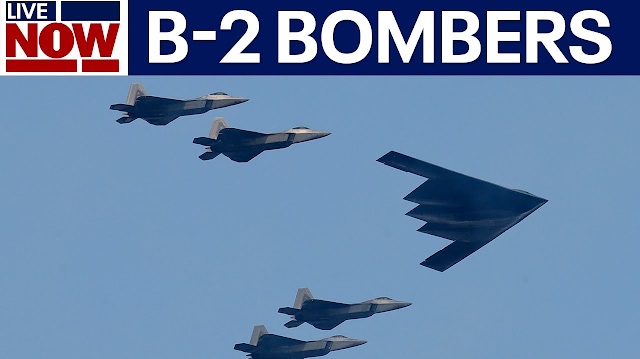By Yiannis Damellos
The Ministry of Unpleasant Situations Presents: “Middle East Mayhem: Or How I Learned to Stop Worrying and Love the Bunker Buster”
As if the Middle East didn’t already have enough drama going on, we now find ourselves in the throes of what could generously be described as “an evolving security situation”—and less generously as the warm-up act for a regional Armageddon. With U.S. B-2 bombers humming toward Guam and 52 more flying over the eastern Mediterranean toward the Middle East, Israeli strikes lighting up Iranian airspace, and Tehran volleying drones back like it’s Wimbledon with nuclear undertones, this regional pot is officially boiling over. Let us now delve into this slow-motion geopolitical Borscht fight, and hope the ceiling doesn’t collapse on our heads.
Just the Facts, Madam Bureaucrat
- The U.S. has launched B-2 stealth bombers from Whiteman Air Force Base, headed for Guam. They're joined by a flotilla of refueling aircraft, because bombers, like teenage boys, are always hungry.
- Also, fifty-two American aircraft swarmed the skies over the eastern Mediterranean this week. Twenty-five of them made a pit stop in Crete, probably for the gyros.
When in doubt, escalate
These bombers, packing GBU-57 bunker busters capable of turning underground facilities into subterranean craters, are now on high alert. And it’s not just for show. U.S. intelligence—delivered with all the subtlety of a fire alarm—now claims Iran is mere “weeks to months” away from producing nuclear weapons. This new assessment came courtesy of Director of National Intelligence Tulsi Gabbard, a woman whose portfolio now includes predicting geopolitical meltdowns with unnerving confidence. Meanwhile, President Trump is reportedly weighing direct military action. Because, naturally, when in doubt, escalate.
And in case anyone was hoping this was just another primate chest-thumping exercise, a whole lot of transport and cargo birds have also been tracked en route to the eastern Mediterranean. That’s not a casual fly-by; that’s how you prep for a war that’s being penciled into the calendar.
Tired Grandmasters and Hungry Neophytes
In parallel to U.S. military maneuvers, Israel has intensified its operations against Iranian military leaders and nuclear sites, claiming to have killed several high-ranking officials from the Iranian Revolutionary Guard.
At the same time, the head of the IAEA, Rafael Grossi, chimed in to note that while the bombed facilities might not have contained nuclear material right now, the strikes are clearly part of Israel’s strategy to preemptively kneecap Iran’s ambitions before the uranium hits the fan.
Iran, for its part, is not taking it lying down. Drone swarms and missile strikes have targeted Israeli territory with disturbing accuracy, causing not only material damage but a rare Israeli admission: yes, some of these attacks actually worked. That’s a bit like a chess grandmaster admitting they just lost a pawn—and a bishop—in one move. Not a good look.
As Israel digs in, all eyes are on Washington
So, this is the trillion-dollar question: Will the U.S. escalate its involvement from support actor to co-star in this real-time geopolitical drama? If Trump gives the green light for American bombers to start pounding Iranian targets, the narrative shifts—from shadow war to full-blown regional confrontation.
Strategically, the rationale is straightforward: Iran with nukes = bad. Very bad. For Israel, it's existential. For the U.S., it's about maintaining dominance and ensuring no one else at the party shows up with bigger firecrackers. But—and it's a big but—the cost of direct engagement is the kind of thing that gives even war hawks indigestion. Iranian retaliation against U.S. assets, proxy flare-ups across the region, oil markets in freefall, global recession? Take your pick.
If the U.S. commits to airstrikes, the regional powder keg doesn't just get a match—it gets a flamethrower.
The Future Is Fragile (and Poorly Managed)
So here we are. American stealth bombers in striking distance. Israeli jets lighting up the radar. Iran is arming drones like it’s Black Friday at Best Buy. And the rest of the world is watching with popcorn and palpable dread.
This isn’t just a clash of military capabilities. It’s a multi-act tragedy with global implications and a cast of leaders who believe escalation is a strategy, not a problem. The smarter move—diplomacy—is apparently on sick leave.
Still, there’s always hope. Not from reason, obviously—but perhaps from exhaustion. Or divine intervention. Or maybe someone simply tripping over the red button and accidentally saving us all.
Until then, keep calm, carry on, and stock up on canned beans. The intermission may be brief, and the next act is likely to involve fire, fury, and a press conference delivered by someone who didn’t read the briefing.






No comments:
Post a Comment